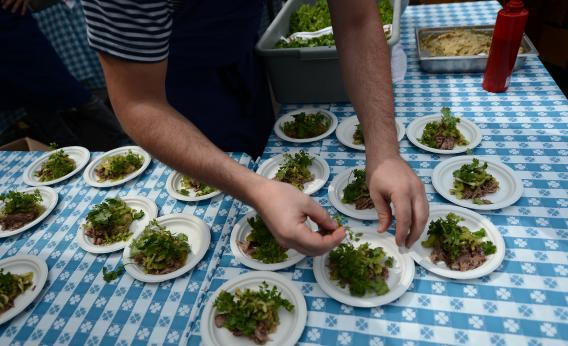Le Fooding is a French culinary organization founded in 2000 with a mission of making French food seem less stuffy and more democratic. First, it hosted several casual outdoor food festivals that were groundbreaking in buttoned-up France. Then it began exporting its event formula to the rest of the world, at which point it inevitably ran into some language barriers. What precisely was le fooding supposed to mean?
“Fooding is the fusion of food and feeling,” one of the founders explained alliteratively to the New York Times Magazine in 2005. As portmanteaus go, this one does not seem so successful—one would have to be psychic to intuit that fooding was based on feeling. (And then there was the problem for French speakers: Fooding sounds like no other French word so much as footing, which means jogging—probably not the activity Le Footing’s founders wanted to evoke.)
Now Le Fooding is confusing us all again, having just announced that its fourth annual New York City food festival will be called “Time Mach’Inn.” The obvious pun (on “time machine”) makes some sense: The menu for the event contains three courses, each inspired by a distinct culinary era from the early 1990s through today. But what’s with the weirdly spelled “Mach’Inn”? The first syllable may be an allusion to the French mâcher, which means “to chew.” Machin in French is a slang term that can be used to mean either “thing” or “what’s-his-name”—a possible reference, but one whose significance is difficult to parse. But why is the second syllable spelled with two Ns? And how come the neologism contains an apostrophe?
We’ve sent an inquisitive email to Le Fooding’s PR reps and will update this post if they get back to us with an explanation of the name. Until then, we’ll be scratching our heads and wishing Le Fooding’s franglais came with an etymological dictionary.
Update, 7:45 p.m.: Le Fooding’s representatives have confirmed that commenter Fabrisse has the right idea. According to Le Fooding’s Anna Polonsky, the name “refers to ‘Inn, a place where food is served, often with sleeping areas available as well’ … as well as to ‘food (chewing it)’ and, above all, to the event concept, that you got perfectly (a menu going back in time).” The “inn” part makes sense when you consider that Time Mach’Inn will take place at Res, an artist residency for chefs in Brooklyn.
Fabrisse adds, “It does kind of work better in German where the Mach could refer to creating the food (or to lamb’s lettuce),” but we feel that the wordplay has enough layers as it is.
